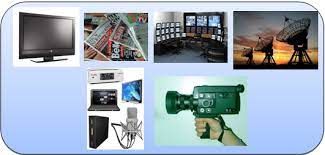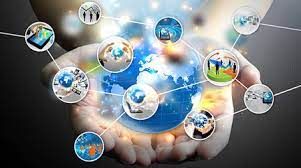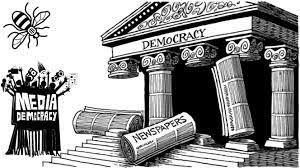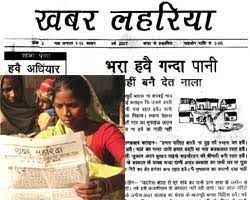Media and technology
- Books Name
- Social Science Book
- Publication
- Cognizance Publication
- Course
- CBSE Class 7
- Subject
- Social Science
Chapter 4
Understanding Media

Media is the plural form of the word medium and it describes the various ways through which we communicate in society. Media refers to all means of communication. Everything ranging from a phone call to the evening news on TV can be called media. TV, radio and newspaper are the form of media since they reach millions of people across the world or masses, they are called mass media. Media is a very effective tool that can help people be more informed and aware of the happenings all over the world. Media also helps people put across their points of view.
Media and technology

Life without media is difficult. The cable TV and the Internet are a recent phenomenon. These have been around for less than 20 years. Both print media and electronic media help played an important role in social change. Changing technology or machines help media to reach more people. For example, it changes the ways in which we think about our lives. It is quite difficult for us to think of our life without television.
Television has enabled to think of ourselves as member of a larger global world. Television images travel huge distances to satellites and cables. This allows us to view news and entertainment channel from other parts of the world. Television has brought the world closer to us. Balanced report is essential in media, which has to report independently. Media is far from being independent. This is because of the control of government over mediacalled censoring and because big business houses control the media. They may influence the media to broadcast news their way.
With electronic typewriters, journalism underwent a sea-change in the 1940s.
Media and money
The different technologies that mass media use are expensive. In a news studio it is not only the news reader who needs to be paid, but also a number of other people who help put the broadcast together. A lot of money spent on getting the latest technology. To meet this cost, a lot of money is required. Media thus has come to be owned by big corporates. Media uses advertising as a tool to raise revenue.

One way in which the mass media earns money by advertising different things like cars, chocolates, close mobile phones, etc.
The cost of advertise on TV channel varies from Rs 1000 to Rs 1,00,000 per ten seconds depending on the popularity of the channel and time.
Media and democracy

Media plays a very important role in providing news and discussing events taking place in the country and the world. New stories of media inform people about important events in the country. If they wish to, people can take action on the basis of these new stories. Some of the ways in which they can do this is by writing letters to the concerned minister, organising a public protest, starting a signature campaign, asking the government to rethink its program, etc. A balance report is one that discuss is all points of view of a particular story and then leaves it to the reader to make up there minds. Writing a balanced report however depends on the media being independent.An independent media means that no one should control and influence its coverage of news.
The print media offers a large variety of information to suit the tastes of different readers.
Reasons for media not being independent and unbiased:
- The first season for media not being independent is the control that the government has on media. When the government preventseither a news item or scenes from a movie or the lyrics of a song from being shared with the larger public. This is referred to as censorship.There have been periods in Indian history when the government censored the media. The worst of these was the emergency between 1975-1977.
- Secondly, the media’s continual need for money and its links to advertising, meaning that it becomes difficult for media to be reporting against people who give them advertisements.
- Thirdly, the media also tends to focus on a particular aspectof a story because they believe this makes the story interesting.
- Also, if they want to increase public support for an issue, they often do this by focusing on one side of a story.
Setting agendas:
Media plays also plays an important role in deciding what stories to focus on. By focusing on particular issuesit influences and shapes our thoughts. It is said that the media set the agenda for people. Very recently, the media reported alarming levels of pesticides in cold drinks. This report lead to safety standards being set for colas. Media plays a very important role in our lives as it tell us about working of government. There are several instances when the media fails to focus on issues that

are significant in our lives. For example, drinking water is a major problem in the country. Every year, thousands of people suffer and die because they do not get safe drinking water. However we seldom find the media discussing this issue.
We need to ask the following questions when analysing data from the news.
- What is the information I am learning from this report?
- What information is not being provided?
- From whose point of view is the article being written?
- Whose point of view is left out and why?
Local media
Recognising that the media will not be interested in covering small issues that involve ordinary people and their daily lives. Several local groups have come forward to start their own media. Several people use community radio, to tell farmers about the prices of different crops and advise them on the use of seeds and fertilizers. Others make documentary films with fairly cheap and easily available video cameras on real life conditions faced by different poor communities, and at times have even, given the poor these video cameras to make films on their own lives.

Another example is a newspaper called Khabar Lahariya which is a fortnightly that is run by8 Dalit women in Chitrakoot district, Uttar Pradesh. Written in the local language bundeli, the 8 page newspaper reports on Dalit issues in cases of violence against women and political corruption, the newspaper reaches formal shopkeepers, panchayat members, school teacher and women who have recently learnt to read and write.

 Cognizance Publication
Cognizance Publication
